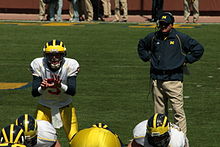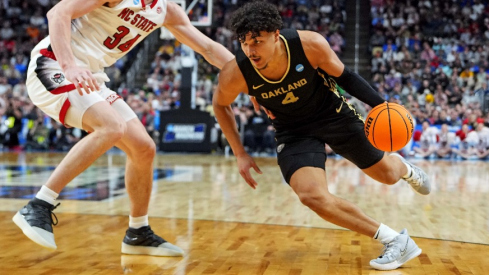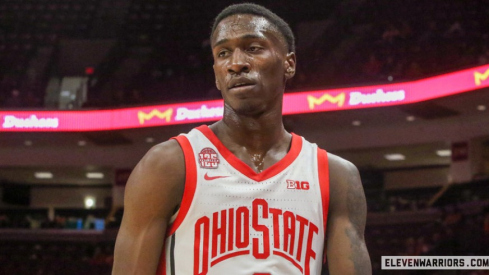 My first problem is probably at Quarterback...
My first problem is probably at Quarterback...In response to my column last week, one commenter asked whether Rich Rodriguez's Michigan failures were a result of offensive shortcomings, or solely to be blamed on other factors. I felt Rodriguez's tenure deserved its own post, because its become a "zombie" opinion in some sectors of the media that the 'spread' offense cannot work in the Big Ten.
Readers of this column know the immediate problem with this mantra is that the spread is not a single offense. The second problem is that Big Ten teams have been running a variety of spread offenses for years. In fact, the game that brought the spread mainstream was a Big Ten game (against the Wolverines). So this meme has no basis in fact.
Putting this aside, it is still worth analyzing why Rich Rodriguez "failed" at Michigan. The most obvious answer to the reader's question is that it was not Rodriguez's offense's fault. Rodriguez's Michigan defenses and special teams worsened every year and were frankly horrible by the end of his tenure. This deficiency, more than anything else, sunk Rodriguez's tenure.
Yet it is too much to give Rodriguez's offenses a free pass. Part of this was personnel, namely finding a quarterback who can do what is so essential to Rodriguez's offense's success.
Yet it also goes deeper. Rodriguez was one of thes spread's original innovators and proponents. As Chris Brown writes, Rodriguez was the Johnny Appleseed of the 'spread,' both by bringing it to schools he was coaching, as well as taking it to others.
The early spread-to-run that Rodriguez pioneered was predicated upon the zone read and play-action two-man pass patterns, such as quick hitches or smash. Rodriguez's offense generally operated from true spread '10' personnel formations with 4 wide receivers, either 2 x 2 or trips.
Below is clips from Northwestern's breakthrough game against Michigan mentioned above, and you can see the spread in its infancy.
This is the offense Rodriguez brought to Michigan. Other than some use of the tight end, Rodriguez' offense remained almost entirely predicated around the zone read run game.
In the meantime, though, other spread offenses evolved. Like anything else, as defensive coaches became more familiar with the spread, they adjusted, both in terms of personnel and tactics.
Offenses such as Oregon, which is still based in the zone-read, responded in a number of ways. One, teams married the spread-to-run concepts with a more conceptual passing game. Two, teams became 'less spread,' using tight ends and H-backs to force 'alley' players to declare and to create angles to permit more variety in the run game. Three, Oregon counteracted the defensive games by incorporating other reads such as the midline option. Four, teams incorporated 'power' blocking concepts to complement zone blocking in a variety of formats, such as with 'inverted veer.'
The upshot is that offenses such as Oregon became more diversified.
Rodriguez largely failed to evolve his offense past the spread's origins.
Chris Brown, for instance, prophetically predicated at the beginning of Rodriguez's Michigan tenure that Rodriguez's passing game lacked the conceptual nature necessary to succeed as teams adapted to the spread's basic tenets.
Nor did Rodriguez (for the most part) diversiify his offense in the way an Oregon has to counteract things such as scrape exchanges. Michigan never embraced plays such as the midline option, inverted veer, power or counter trey like others.
The upshot is that, while Michigan's offense was largely succesful once Denard Robinson was in place, it never hummed in the way Oregon's offense did (particularly against better teams) to overcome Michigan's defense or special team liabilities.
The problem, therefore, was not so much with having a spread-to-run offense in the Big Ten, as failing to adapt to what defenses have done to face spread offenses.
Rodriguez may face some of those same problems in the Pac-12 unless he similarly evolves.

